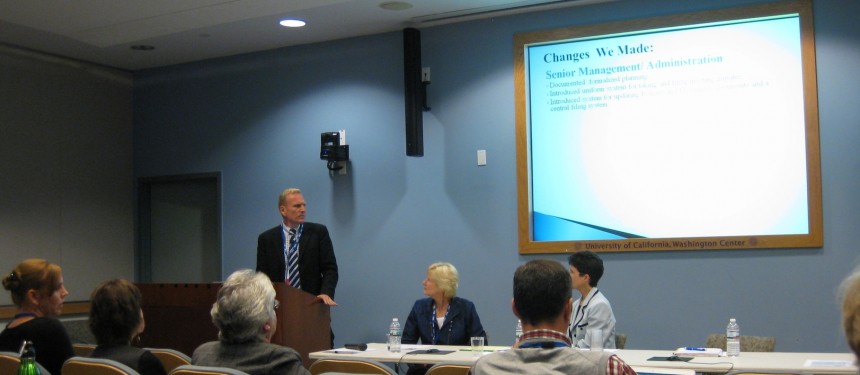Incredible as it sounds, until 2011, regulation of the Intensive English Program (IEP) sector of the US international education offer was piecemeal, with accreditation bodies, CEA and ACCET, available for those who sought to reinforce their quality status but no mandatory requirements for English language schools accepting international students and issuing I-20 forms for the visa application process.
News and business analysis for Professionals in International Education
Have some pie!
Eve of new regulatory era looms in the USA
 James Stakenburg explained how the accreditation process has benefited his institution
James Stakenburg explained how the accreditation process has benefited his institution That changed when the government announced in 2010 that, under the auspices of The Accreditation of English Language Training Programs Act, by December 2011, all ESL programmes had to gain or at least apply for accreditation – the sector was given two years to ensure all IEPs had jumped through required quality hoops and so be able to continue to offer I-20s.
That deadline of December 15, 2013, is fast approaching, and a new regulatory environment looms.
At the recent IEP Stakeholders’ Conference organised by EnglishUSA, Mary Reeves of CEA shared that her accrediting agency had 102 accredited English language program sites before December 2011. To date, they have 190 accredited sites, and she estimates that by December they will have 260.
This is an indication of the number of IEPs that were previously operating without certified status of their quality controls: around 150 new programs accredited by just one of the two quality assurance agencies.
At fellow accrediting agency, ACCET, another 50 IEPs have either been accredited or remain in process since December 2010, informs Judy Hendrickson, Associate Executive Director.
Hendrickson added that in the past five years, 23% of all initial applicants to ACCET had been denied initial accreditation. “Similar outcomes were reported for IEPs seeking initial accreditation with ACCET since the Accreditation Act was passed in December 2010.”
“Is this a road that we want to go down?”
At the stakeholders’ conference in Washington, DC, the accreditation process was a key conversation point for delegates, including those representing IEPs at state-run institutions, who – after a scare when it seemed their university’s “umbrella” accreditation might not be sufficient – may be considering separate, IEP-specific vouchsafe anyway.
Julie Strecker, Director of the English Language Institute at Mercer University, Atlanta, GA whose program is accredited through Southern Association of Colleges and Schools (SACS), told The PIE News that she attended the conference “to learn from my colleagues in the field and figure out, is this a road that we want to go down? Are we satisfied with just being under the umbrella of SACS? There are I think certain freedoms that come with that.”
After hearing a presentation of an organisation that went through the accreditation process, Strecker added that it was valuable to hear the benefits listed from an IEP’s point of view as her program considered getting accreditation in addition to SACS.
I-20s are issued for a programme of study, SEVP pointed out, and students must meet eligibility requirements
“From an administrator’s perspective, having that regularity and consistency is something that’s hard to get and hard to sell,” she said.
The Student Exchange and Visitor Program (SEVP) led off the conference by presenting updates for IEPs working in the accreditation process. Representatives from SVP’s Analysis and Operations Center (SAOC), School Certification Unit (SCU) and Policy divisions dealt with issues such as F-2 and B status, student travel and temporary absence.
The presenters also highlighted SEVP’s concerns with bridge programmes and conditional admission. As The PIE uncovered last year, SEVP has indicated that it would no longer allow one I-20 to be issued for both a bridge programme and onward undergraduate study course, meaning students must re-apply for another I-20.
I-20s are issued for a programme of study, SEVP pointed out, so students must meet eligibility requirements before they can receive the document.
Presenters told EnglishUSA members that initial admission is a useful tool for students who do not meet requirements, but it then raises the question of what document they should receive and added that SEVP is actively seeking feedback from IEPs on the issue.
CEA had 70 sites in process when they presented at the conference
SEVP officials (Link Powars, Anisha Woodley, Tim Futoran and Mike Hallahan) then addressed the resulting concern from the field that SEVP is not appreciative of innovation by asserting that SEVP views international education as extremely important. But, they said, SEVP must uphold governing law and expectations.
[more >]
Still looking? Find by category:


